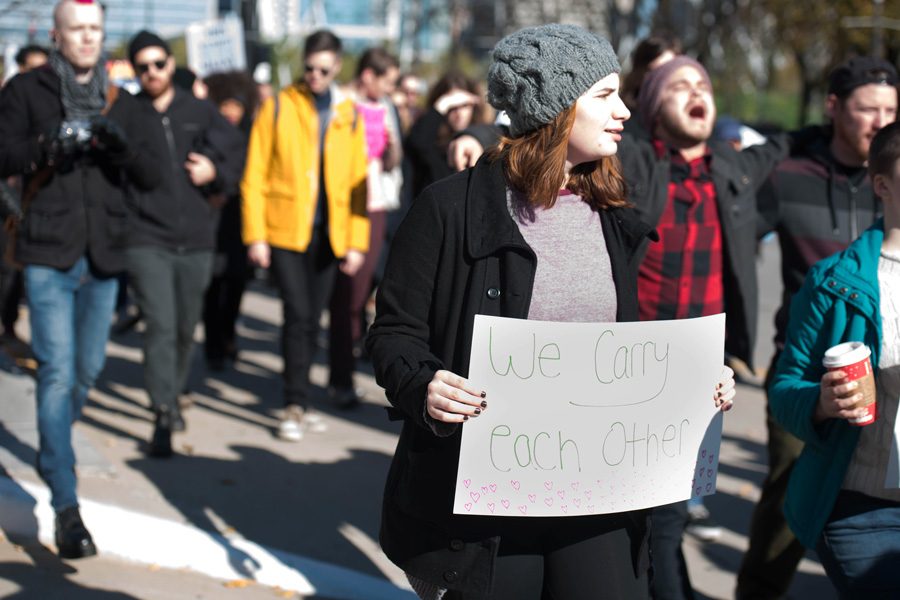More than 200 Evanston community members to attend Women’s March on Washington
Katie Pach/Daily Senior Staffer
Marchers hold signs at a post-election protest in Chicago on Nov. 12. Over 200 Evanston community members are planning to go to the Women’s March on Washington the day after president-elect Donald Trump’s inauguration.
January 16, 2017
A few days after Election Day, Evanston resident Nina Kavin realized she had to get off her couch and stop crying.
After shaking off her disappointment over the results of the 2016 presidential election, Kavin — the creator of “Dear Evanston,” a Facebook discussion page examining local gun violence issues — began to search for a way to make a national stand against “hate and bigotry.” She found the Women’s March on Washington.
The march, a grassroots effort spearheaded by a national coordinating committee, is a response to rhetoric during the election cycle that “demonized” people of color, Muslim Americans, and LGBTQ and immigrant communities, according to the organization’s website. The march will bring together communities that are “hurting and scared” to “send a bold message” on Jan. 21, the day after Trump’s inauguration, the website said. About 200,000 people are estimated to be attending.
But for Kavin, a trip to Washington with her husband and two children would cost about $4,000 in flight tickets and hotel rooms.
“I thought, ‘That’s crazy,’” Kavin said. “And then I thought, ‘Well if I can’t afford that, I bet there are tons of people in Evanston who also want to go and won’t be able to fly and stay in a hotel.’”
After posting about wanting to attend the march on Facebook, Kavin was able to connect with two other interested Evanston women, Evan Finamore and Kathleen Long, in mid-November.
Together, they secured one private bus for the community and — to ensure money wasn’t a restriction — set up a GoFundMe fundraising page to subsidize as many seats as possible.
The response to their efforts was overwhelming.
A total of 220 community members — mostly women — registered to attend the march, pushing the number of buses departing Evanston up from one to four, Finamore said. The cost of each seat was $164, and by Dec. 15 they were completely sold out.
In addition, some people who weren’t able to attend the march pitched in by baking cookies, buying supplies for the overnight bus journey and donating to the GoFundMe page. The community pitched in $4,745 to the fundraising effort, which will allow 25 people to attend the event free of charge, according to the GoFundMe page.
“It feels like we’re kind of carrying the mantle for the community,” Finamore said. “For every person that’s getting on a bus, I could tell you two other people (who) can’t go for whatever reason support wholeheartedly what we’re trying to do and the fact that we want to be a united entity from Evanston.”
When she learned that there was an Evanston contingent going to the march, first-year University of Chicago law student Mariah Garcia emailed the organizers asking for financial assistance. She was informed soon after that her seat would be fully paid for through donations.
Garcia, an Evanston native, became increasingly excited about the prospect of being able to go to Washington with the community she knew and grew up in.
“I decided that I needed to go,” Garcia said. “This election has allowed there to be a lot of hatred to be brought to the surface and legitimized through our political system. It’s really important that we fight back against that peacefully, and also forcefully, so I hope that I can be a small part of that.”
Sitting next to each other in Kavin’s house, Finamore and Kavin stressed the importance of connecting the national importance of the march to Evanston.
Kavin said the election’s rhetoric highlighted key issues in Evanston, such as race relations and inequity. She and the other organizers are working with a number of local activists and leaders to set up informal programming on the bus journey centered on these topics.
“People are afraid, and we want to feel empowered,” Kavin said. “We want to come back from the march and feel like we’ve made new friendships and have new ways of connecting back home.”
Email: [email protected]
Twitter: @rdugyala822












